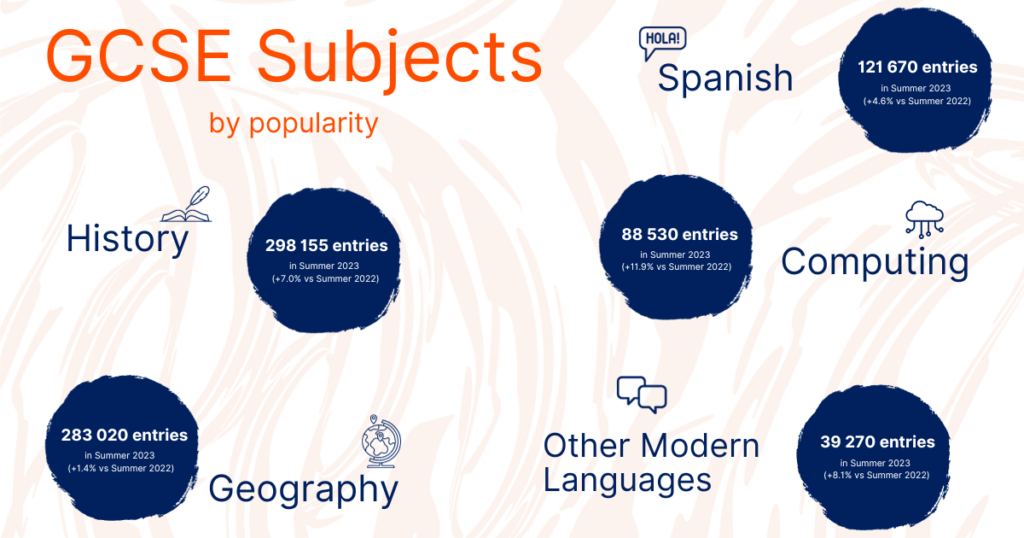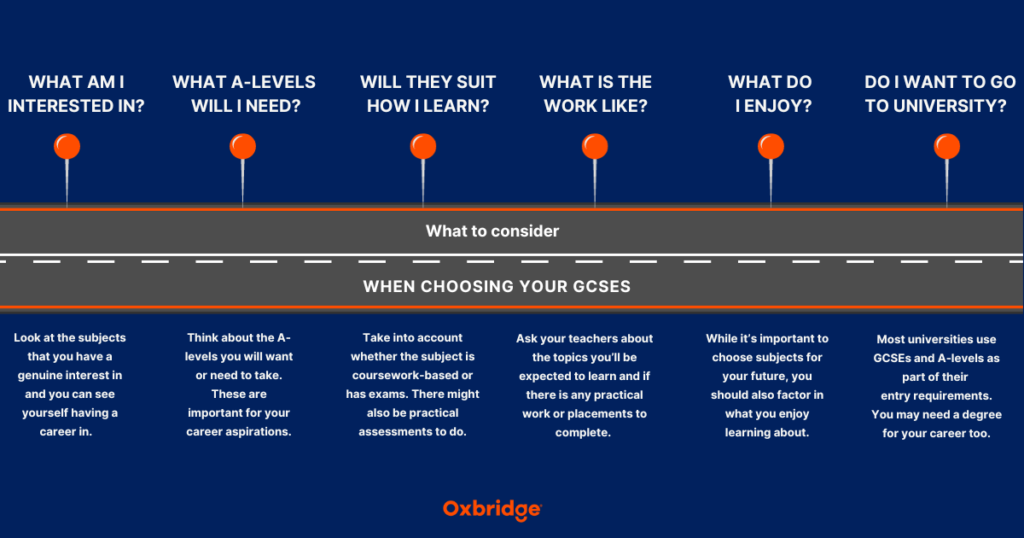Whether you dream of becoming a doctor, are passionate about working with animals, or have hopes of being a teacher, getting the right GCSEs is the first step. Deciding on the best combination of subjects is not a decision to rush, and it can be a daunting one at the same time.
At Oxbridge, we've put together this essential guide to choosing GCSEs, including how to make the best selection for your career aspirations and according to what you are most interested in.
- What are GCSES?
- How many GCSES can I choose?
- Are there any compulsory subjects?
- What are the most popular GCSE choices?
- When do I need to make my decision?
- How do I choose GCSEs that are right for me?
- How are GCSEs graded?
- Can I sit my GCSEs at any age?
- Will I need to sit exams?
- Can I take GCSEs online?
- Can I study GCSEs outside the UK?
- What happens after taking GCSEs?
- Ready to choose your GCSEs?
What are GCSEs?
GCSEs - General Certificate of Secondary Education to give the full title - represent the first step in shaping your future. Achieving the right grades at GCSE enables you to move onto A-levels and then university, or alternative paths if you feel that university is not right for you.

How many GCSEs can I choose?
You will need to choose a minimum of five GCSE subjects that you want to study between Years 10 and 11 (or 14-16 years of age). Some decide to take more than five, but this is up to you and what your preferences are. Most students tend to study anywhere between eight and 10 subjects - it all depends on what you want to do when you leave school.
Are there any compulsory subjects?
You will be required to take GCSEs in English, maths, and science alongside your choice subjects. These three are known as the core subjects.
Some schools and colleges also have additional core subjects, such as French or Spanish, so make sure you know exactly what these specific requirements are at your school.
What are the most popular GCSE choices?
According to GOV.uk data, computing is one of the subjects that has grown in popularity the most, with entries for 2023 up 11.9% compared to 2022. There have also been notable increases in entries for History and Geography, however slight decreases were found in German and ancient languages.

When do I need to make my decision?
Your teachers and tutors will likely start getting you to think about choosing your GCSEs throughout Year Nine, with the final choices being made towards the end of that year. Bear in mind, some schools will get you to make your selection in Year Eight, so make sure you check if you are unsure.
Speak with your teachers, family, and friends to get some advice, but remember, the final decision is yours.
How do I choose GCSEs that are right for me?
Everyone is different. The answer to this question depends on several factors. Start by asking yourself these questions:
- What am I interested in?
- What is the work like?
- What A-levels do I need or want to study for my future career?
- Do I want to go onto university? What courses would I be interested in studying?
- Which courses suit how I learn?
- What would I enjoy?
You may also need to consider where you will learn as well as the subjects themselves. Most of the time, you will be able to study your GCSEs at the same school you have been at since Year Seven, but this isn't always the case. There might be a specific GCSE that you have an eye on but which is unavailable at your current school, or it might simply be a case that it only teaches students up to a certain age.

How are GCSEs graded?
GCSE grades follow a numerical scale from 1 (lowest) to 9 (highest). To pass a GCSE, you will need to achieve at least a grade 4, which is considered a 'standard' pass, or a grade 5, referred to as a 'strong' pass. You will be required to pass English and maths to at least grade 4, otherwise a resit will be compulsory.
This system came into effect in 2017, when English Language, English Literature, and Maths became the first subjects to follow this model. By 2020, all subjects used the numerical system instead of the previously used A* - E criteria.
Can I sit GCSEs at any age?
Though they are traditionally studied between the ages of 14 and 16, GCSEs are open to learners of all ages. At Oxbridge, our online GCSEs have been studied by people looking to get back into education after raising a family or who found learning in a physical classroom challenging. By studying remotely, you can learn at the pace that works best for you, from the comfort of your own home.
Will I need to sit exams?
Not all GCSEs follow the same structure when it comes to exams and assessments. Some, by their nature, rely more on assessments and coursework, whereas others are graded based on exams at the end of specific units. In addition, exams are taken at different points of the academic year - some are in the summer term, others take place just after the Christmas break.
If you're the sort of person who struggles under exam conditions or finds it hard to cope with the pressure of revision, you may want to consider courses that are more coursework-based. On the other hand, having to complete a series of assessments throughout the duration of the year is also not for everyone.

Can I take GCSEs online?
With distance learning, you can study your GCSEs from home. As long as you have access to a laptop, tablet, or mobile device, and an Internet connection, you can get all the course materials you need at any time or location. Online learning could be ideal if you need to retake GCSEs, find it hard learning in the traditional classroom, or need a bit of extra support in between lessons.
At Oxbridge, our expert tutors provide unlimited support through assessments and feedback whenever you need some additional help. We offer all of the core GCSE subjects - English, Maths, and the individual science subjects - as well as languages, business, and even astronomy.
Can I study GCSEs outside the UK?
While GCSEs are the recognised qualification here in the UK, you can also study the IGCSE (International General Certificate of Secondary Education) if you are looking to take your studies abroad. Or, if you are looking to study in the UK, the IGCSE is the ideal gateway qualification.
IGCSEs are awarded the same level as GCSEs and by and large, follow the same course content. The main difference is that IGCSEs are accepted in countries including Canada, India, Australia, and many more. Take a look at this article for more about the difference between the two.
What happens after taking GCSEs?
GCSEs typically take two years to complete. After that, the next step is typically studying A-levels, which are essential for progressing on to university or higher education. In a similar way to choosing GCSEs, you should keep in mind what your future aspirations are, what you are interested in or passionate about, and what you'll need to do in order to fulfil those hopes.
Of course, there are plenty of other options out there. For example, you might decide to take an apprenticeship or internship to gain valuable real-world experience or take an alternative course for a specific career. Regardless, getting a good set of grades at GCSE level is more often than not where it all begins.

Ready to choose your GCSEs?
Choosing GCSEs can seem like a minefield, however, we hope that this guide has given you some insight into how to make the right decision for you and future hopes. If you're still unsure, or if you're ready to make your choices, our learning advisers will get you started. Get in touch here or on 0121 720 9363.
